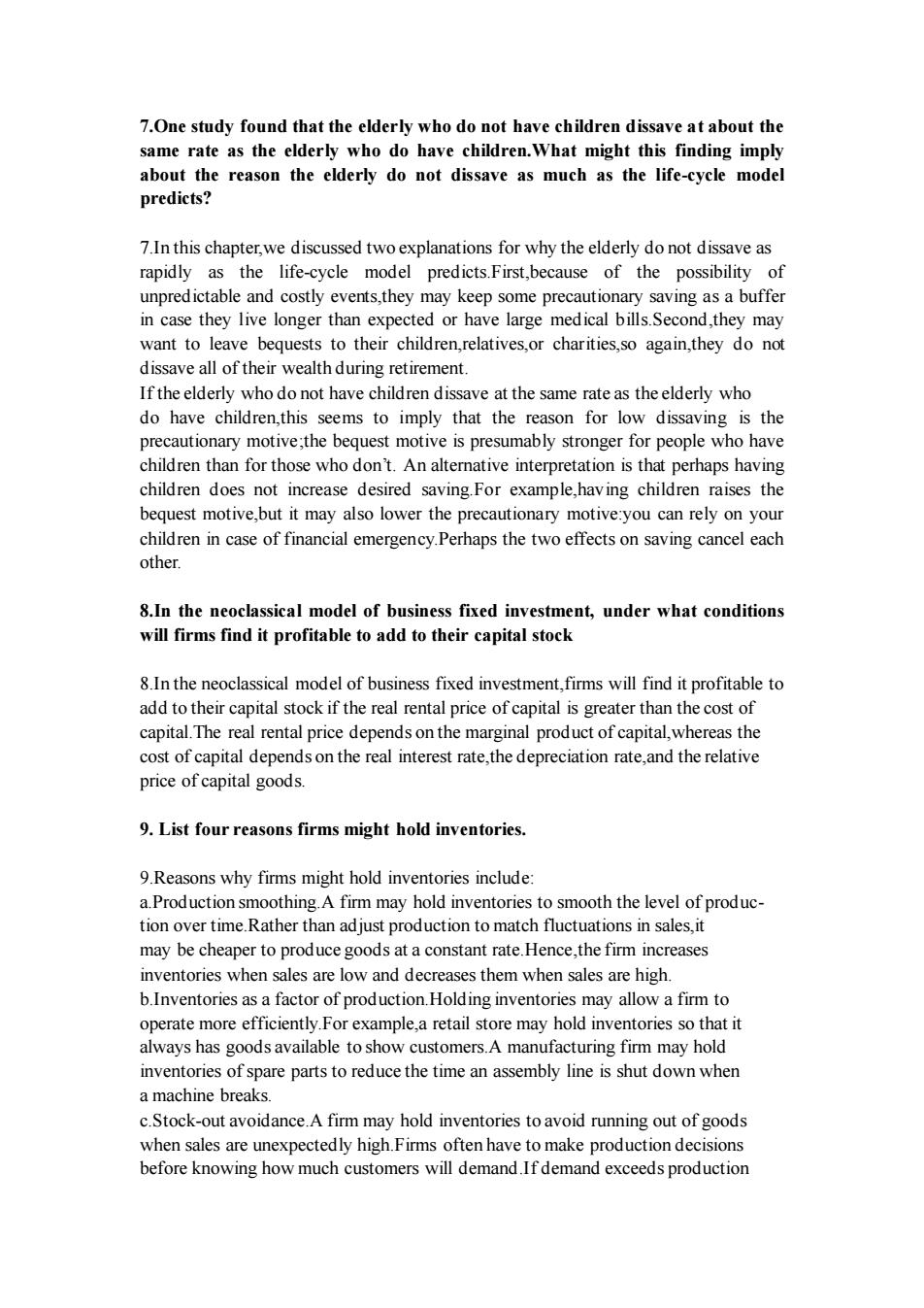正在加载图片...

7.One study found that the elderly who do not have children dissave at about the same rate as the erly who do have children.What might this finding impl about the reason the elderly do not dissave as much as the life-cycle model predicts? 7.In this chapter,we discussed two explanations for why the elderly do not dissave as rapidly a the life-cycle model predicts First,because of the possibility of unpredictable and costly events,they may keep some precautionary saving as a buffer in case they live longer than expected or have large medical bills.Second,they may want to leave bequests to their children,relatives,or charities,so again,they do not dissave all of their wealth during retirement. Ifthe elderly who do not have children dissave at the same rate as the elderly who do have children,this seems to imply that the re son for low dissaving is the precautionary motive,the bequest motive is presumably stronger for people who have children than for those who don't.An alternative interpretation is that perhaps having children does not increase desired saving.For example,having children raises the bequest motive,but it may also lower the p motive:you can rely on your chil ren in case of financial emergency.Perhaps the two effects on saving cancel each othe 8.In the neoclassical model of business fixed investment,under what conditions will firms find it profitable to add to their capital stock 8.Inthe neoclassical model of business fixed investment,firms will find it profitable to add to their capital stock if the real rental price of capital is greater than the cost of capital.The real rental price depends on the marginal product of capital,whereas the cost of capital depends on the real interest rate the depreciation rate and the relative price of capital goods. 9.List four reasons firms might hold inventories. 9.Reasons why firms might hold inventories include: a.Production smoothing.A firm may hold inventories to smooth the level of produc. tion over time.Rather tuationsi ales it may be cheaper to produce goods at a constant rate.Hence,the firm in inventories when sales are low and decreases them when sales are high b.Inventories as a factor of production.Holding inventories may allow a firm to operate more efficiently.For example,a retail store may hold inventories so that it always has ods available to she mers.Ar hold inventories of spare parts to reduce the time an assembly line shut down wher a machine breaks c.Stock-out avoidance.A firm may hold inventories to avoid running out of goods when sales are unexpectedly high firms often have to make production decisions before knowing how much customers will demand.If demand exceeds production7.One study found that the elderly who do not have children dissave at about the same rate as the elderly who do have children.What might this finding imply about the reason the elderly do not dissave as much as the life-cycle model predicts? 7.In this chapter,we discussed two explanations for why the elderly do not dissave as rapidly as the life-cycle model predicts.First,because of the possibility of unpredictable and costly events,they may keep some precautionary saving as a buffer in case they live longer than expected or have large medical bills.Second,they may want to leave bequests to their children,relatives,or charities,so again,they do not dissave all of their wealth during retirement. If the elderly who do not have children dissave at the same rate as the elderly who do have children,this seems to imply that the reason for low dissaving is the precautionary motive;the bequest motive is presumably stronger for people who have children than for those who don’t. An alternative interpretation is that perhaps having children does not increase desired saving.For example,having children raises the bequest motive,but it may also lower the precautionary motive:you can rely on your children in case of financial emergency.Perhaps the two effects on saving cancel each other. 8.In the neoclassical model of business fixed investment, under what conditions will firms find it profitable to add to their capital stock 8.In the neoclassical model of business fixed investment,firms will find it profitable to add to their capital stock if the real rental price of capital is greater than the cost of capital.The real rental price depends on the marginal product of capital,whereas the cost of capital depends on the real interest rate,the depreciation rate,and the relative price of capital goods. 9. List four reasons firms might hold inventories. 9.Reasons why firms might hold inventories include: a.Production smoothing.A firm may hold inventories to smooth the level of production over time.Rather than adjust production to match fluctuations in sales,it may be cheaper to produce goods at a constant rate.Hence,the firm increases inventories when sales are low and decreases them when sales are high. b.Inventories as a factor of production.Holding inventories may allow a firm to operate more efficiently.For example,a retail store may hold inventories so that it always has goods available to show customers.A manufacturing firm may hold inventories of spare parts to reduce the time an assembly line is shut down when a machine breaks. c.Stock-out avoidance.A firm may hold inventories to avoid running out of goods when sales are unexpectedly high.Firms often have to make production decisions before knowing how much customers will demand.If demand exceeds production